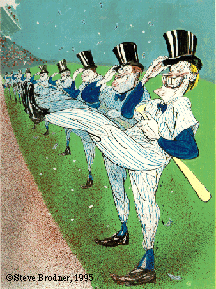 The University of Chicago Magazine June 1995
The University of Chicago Magazine June 1995

By Allen R. Sanderson
Art by Steve Brodner
AS MAJOR LEAGUE BASEBALL FANS and critics chose sides during the recent eight-month labor-management dispute, they debated virtually every aspect of the business of baseball: the profitability of franchises, the strike's impact on local economies, baseball ticket prices, players' salaries -- even the values of a society that pays star athletes as much in one day as many high-school teachers make in a year.
In the three years since I developed a new course at Chicago on the economics of sports, interest in the topic has risen -- never more so than during the strike, when I received almost daily requests for interviews from local and national reporters seeking economic insights into the walkout, and its implications for the future of baseball. Nearly as often, students and colleagues would stop me on the quadrangles to get my opinion on the latest strike developments -- sometimes even offering a "free lunch" in exchange for some baseball talk.
As I learned in these many discussions, paraphrasing Twain, it's not so much what you don't know that gets you into trouble, it's what you think you know that turns out to be wrong. The following myths and realities are drawn from questions or assertions frequently aired during and after the strike, accompanied by some data and the application of some basic economic theory. So: "Play ball! Batter up!"
It now costs over $100 for a family of four to attend a game. Hasn't baseball priced itself beyond the reach of the average fan?
Whether something is thought to be dear or cheap depends on its price increases over time, its price relative to goods or services we could substitute for it, and our ability to pay for it. On any of these criteria, tickets to baseball games are cheap and getting cheaper.
Click here to continue reading "Bottom-line Drive"